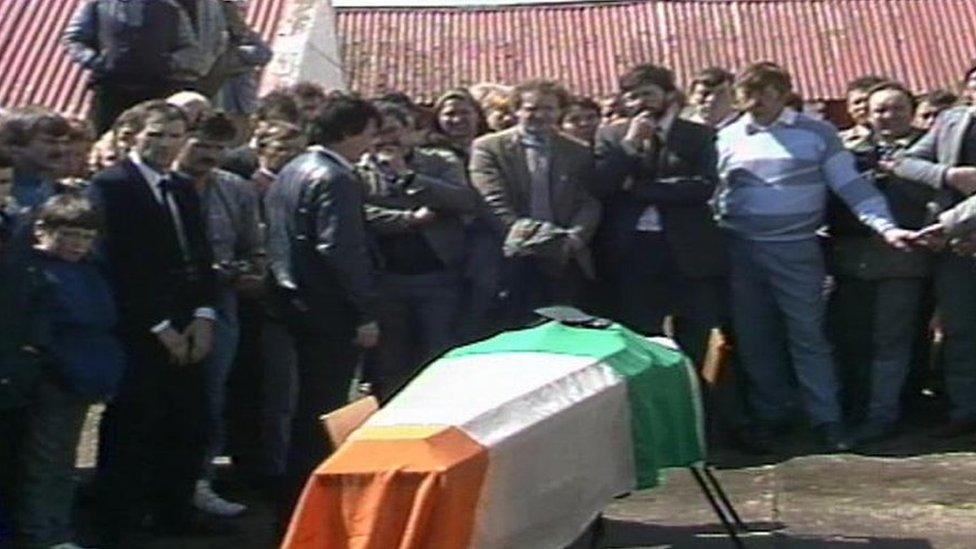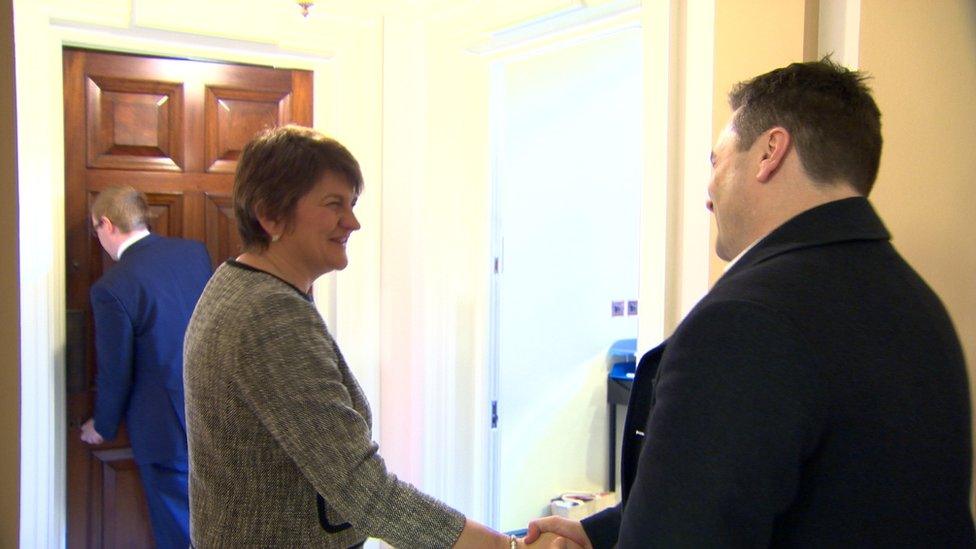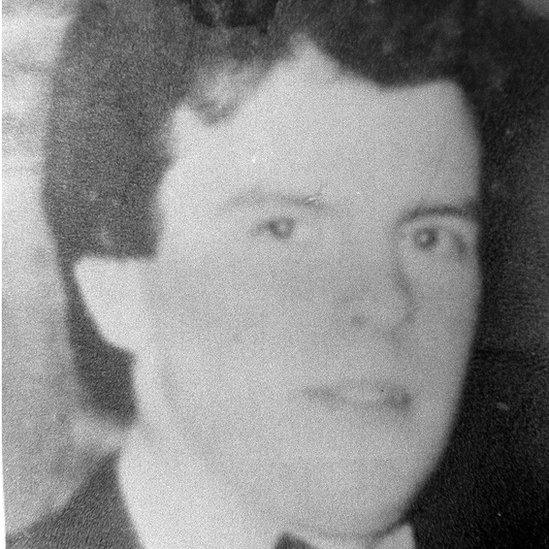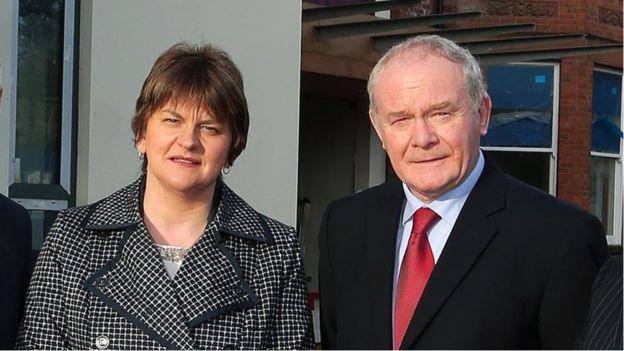Why Arlene Foster struggles with Martin McGuinness and the past
- Published

Martin McGuinness and Gerry Adams at the 1986 funeral of Seamus McElwaine
Northern Ireland First Minister Arlene Foster struggles with the fact that, in 1986, Deputy First Minister Martin McGuinness, gave a graveside oration at the funeral of the IRA man who, she believes, tried to murder her father. BBC NI Spotlight reporter Declan Lawn went to Fermanagh to find out more.
It is a bright morning in Roslea, County Fermanagh, and I'm out walking with dairy farmer and former Ulster Unionist councillor Harold Andrews.
We stop to survey the rolling countryside around us.
It is beautiful here today and peaceful.
But Harold is remembering different times - specifically the morning in April 1986 when, just a couple of fields away, a young IRA man called Seamus McElwaine was killed by the SAS.

Mrs Foster talked to Declan Lawn of Spotlight about the attack on her father
"He was planting a culvert bomb designed to kill security forces," says Harold.
"The main bomb had been there for several days. My wife and children had been driving by it every day on the way to school and back. If it had gone off they would have been blown to bits."
The security forces discovered the bomb and sent an SAS team to observe it. When McElwaine returned to detonate it early the next morning, he was shot dead.
By then, aged just 26, he was already a notorious IRA gunman, having previously been convicted of two murders.
He escaped from the Maze prison in 1983, and returned to Fermanagh, where he took up his campaign of violence once again.
It's thought that McElwaine was involved in several other murders and attempted murders in Fermanagh.
One of the earliest shootings he is suspected of having been involved in was the attempted murder of an RUC Constable called John Kelly.

Seamus McElwaine was shot dead by the SAS in 1986
A part-time farmer, he lived with his young family outside Roslea. One night, when he went out to check on the animals, two gunmen opened fire with automatic rifles from behind a hedge.
Miraculously, John Kelly received only a superficial head wound before managing to make his way back into the house, where he was met by his eight-year old daughter - who would later become the first minister of Northern Ireland.
"My father came crawling in," recalls Arlene Foster.
"He was bleeding and he told us all to go upstairs because in his bedroom there were flares which had been fitted in case of an emergency and he put the flares off.
"And we were all lying on the bedroom floor. And it was less than 10 minutes later the police arrived - but it felt like a very long 10 minutes"
Mrs Foster said that until that night, she had not heard of the Troubles and had no conception of political violence, but all of that changed in an instant.
By the time she was a teenager, Arlene Kelly knew the name Seamus McElwaine well - the police had told her family years before that this was the man whom they believed had tried to kill her father. He was a man who border Protestants lived in fear of.

Nevertheless, Mrs Foster said the past was the past and she would work with Martin McGuinness
When he was killed in 1986, McElwaine was treated by the mourners as a Republican hero.
Standing prominently amongst the crowd were Gerry Adams and Martin McGuinness.
Mr McGuinness gave the graveside oration. He said that Seamus McElwaine was "a highly intelligent IRA volunteer and freedom fighter" who was "a saint" when compared to Margaret Thatcher.
This is a painful personal connection between the first and deputy first ministers that even now, Arlene Foster at times struggles with.
"It is quite difficult," she says.
"If you talk to Martin McGuinness now, he will say that unionists aren't the enemy, the enemy is poverty, the enemy is unemployment. That's fine, but it doesn't take away from the fact that he thought it appropriate to speak at Seamus McElwaine's funeral, a man who had been responsible for murdering many people in County Fermanagh."
Nonetheless, she insists that "the past is the past, and I can't change it", and believes that the job of making Northern Ireland better and consolidating the hard-won peace, is what is now most important.
I ask her if those childhood experiences turned her into someone who was bitter.
"I have no doubt that as a teenager I was bitter," she agrees.
"And have you changed?" I ask.
She laughs. "I certainly hope so. "
She now says she wants to concentrate on the future, on the kind of "bread and butter" issues that she hopes will come to define politics in Northern Ireland.
Back in Fermanagh, Harold Andrews says he no longer pulls the curtains at night with a feeling of dread.
"It's a different place we're in now," he says. "People are getting on with their lives. They are mixing with their neighbours. Life in this area is completely different".
Spotlight is on Tuesday 9 February on BBC One NI at 22:45 GMT